Guide to Kindergarten in Singapore: Choosing the Right Preschool for Your Child
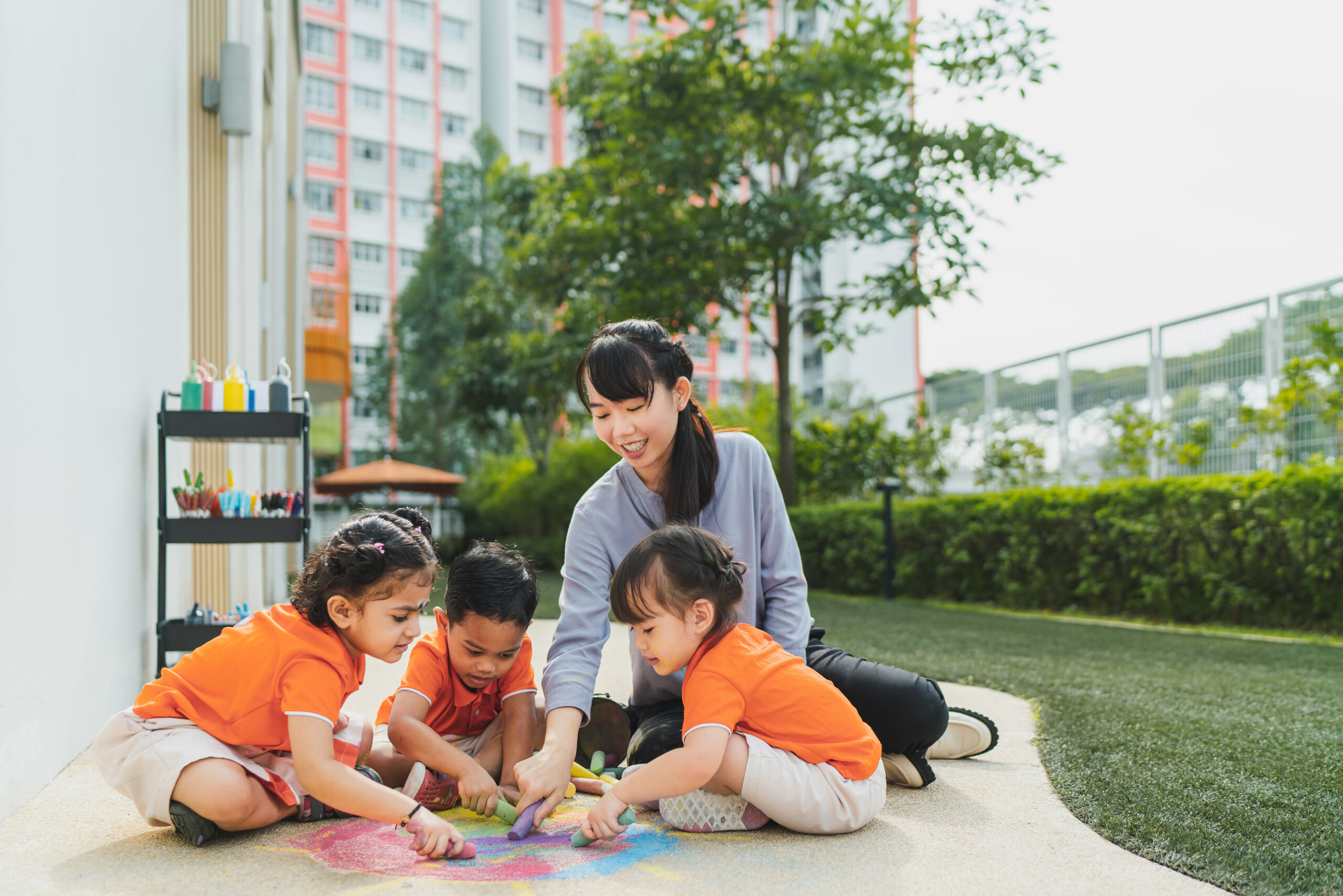

Curious about what kindergarten involves and why it’s crucial for your child? This guide breaks down everything you need to know about kindergarten in Singapore. We’ll discuss the benefits and key components of the curriculum in kindergarten. We’ll also cover the factors to consider when choosing a preschool or kindergarten in Singapore, and how to pick the right one for your child.
The concept of kindergarten originated in the 17th century when it began as a place for child care and moral education. The term “kindergarten” itself is derived from the idea of nurturing children like plants, providing them with the care and education they need to grow and thrive. Kindergarten education is crucial for young children, especially in our fast-paced society where early childhood education lays the foundation for future learning.
In Singapore, children start kindergarten education at 5 years old, but there are preschool programmes available for children at younger ages, from 18 months to 4 years old. Thereafter, compulsory attendance at a primary school begins when a child is 7 years old.
Kindergarten offers a range of activities that enhance children’s skills and abilities. It fosters curiosity, cognitive development, time management, and discipline, preparing them for future academic challenges. Activities like reading stories, singing songs, and role-playing help develop their language and communication skills.
Kindergarten provides essential advantages that contribute to a child’s holistic development and prepare a child to enter primary school. It fosters cognitive development, enhancing problem-solving and critical thinking abilities, essential for future academic success. When children enter Primary 1, they should be able to demonstrate basic literacy and numeracy skills, and developing these skills in kindergarten helps lay a strong foundation for lifelong learning.
Kindergarten education offers benefits beyond giving children a strong academic foundation. It helps children develop independence and emotional resilience, which are needed as they adapt to new environments and manage new responsibilities in primary school. Further, kindergarten also supports social growth, teaching kids to form healthy relationships, handle conflict, and develop empathy – essential skills for building community and belonging.
Finally, outdoor play and other physical activities in kindergarten will help children develop motor skills and maintain their overall health and fitness in their early years.
We elaborate on these benefits in greater detail below.
Most kindergarten curriculums should offer a well-rounded education covering essential subjects. Literacy skills, including letter recognition, phonics, and text comprehension, are foundational. These early literacy skills prepare children for more complex academic concepts in primary school.
At My First Skool, we empower our children to learn through a pedagogical approach called PETAL© – Playing, Exploring, Thinking, and Applying Learning. This approach provides facilitated play experiences that encourage active exploration, critical thinking and making meaningful discoveries.
Mathematics instruction emphasises counting, number recognition, basic addition and subtraction, and understanding simple patterns. These numeracy skills help children develop a strong understanding of mathematical concepts, serving as a foundation for primary school.
Hands-on science education also encourages kindergarten children to ask questions and conduct simple experiments, fostering curiosity and critical thinking skills. Most kindergarten school curriculums will also include creative arts activities like drawing, singing, and dancing to foster creativity and emotional expression.
Apart from structured learning activities, engaging in play in kindergarten enhances creativity and imagination, crucial for cognitive development. Pretend play fosters language development and allows children to express their ideas and emotions. Puzzles and games also help children to enhance their decision-making, problem-solving and critical-thinking abilities.
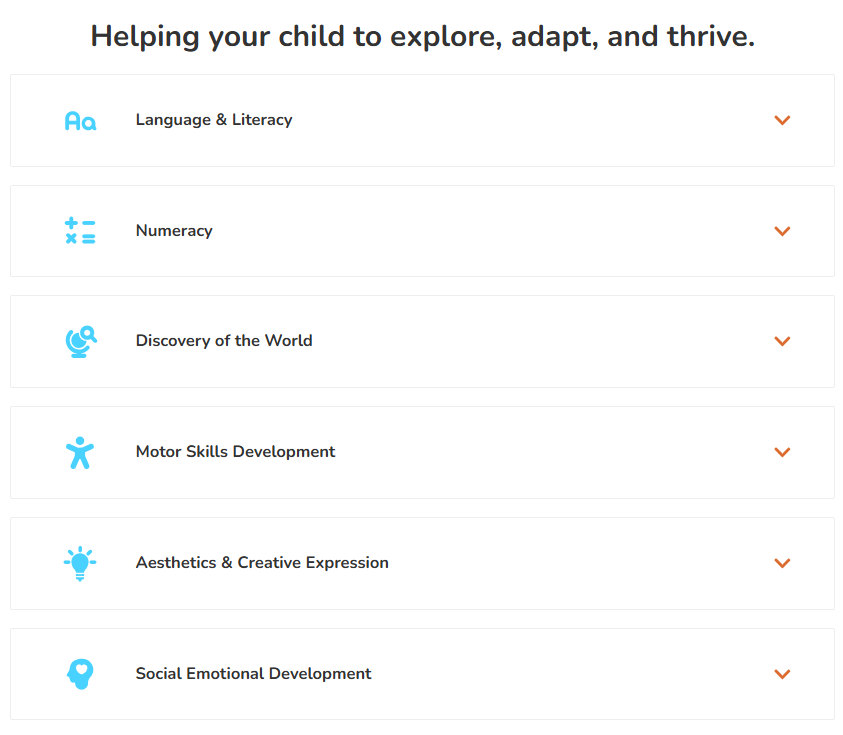
Emotional and social development is a critical aspect of kindergarten education. Kindergarten fosters independence by teaching children to perform tasks with minimal help from teachers. Managing their belongings and personal hygiene builds responsibility, boosting confidence and self-esteem. These skills also enable better concentration and effective engagement with peers.
Through group play and interactions with their peers in kindergarten, children also develop teamwork, collaboration and communication skills. Interactive games and activities teach children the value of working together, sharing, and supporting one another. These social skills are essential for building healthy relationships and a sense of community.
Further, when interacting with their peers in kindergarten, children are bound to face conflicts and disagreements. In this nurturing environment and under the guidance of educators, children can learn to manage their emotions, deal with such conflicts or challenges, and empathise with others. The ability to handle conflict and self-regulate are essential for overall well-being and success in future academic and social settings.
Physical education focuses on developing motor skills and overall health. Outdoor play enhances motor skills such as agility, balance, and coordination, essential for physical development and practical tasks.
Regular outdoor activities significantly benefit children’s health. They contribute to:
Exposure to outdoor environments presents diverse physical challenges, building self-confidence and resilience. These experiences support physical development and also contribute to emotional and social growth, making physical education a vital component of kindergarten learning.
Parental involvement significantly enhances children’s education in kindergarten. Engaging with your child’s education provides essential support and encouragement. Regular communication with teachers, participation in classroom activities, and a supportive home learning environment are key ways parents can be involved.
Involving parents in school activities and fostering community connections enhances children’s learning experiences. Active parental involvement makes children feel supported and motivated to succeed. It also strengthens the school community, creating a positive and collaborative environment for all students.
Effective parent involvement benefits the child’s academic success and promotes a stronger school community. Collaboration between parents and educators ensures children have the best possible start in their educational journey.
Choosing the right kindergarten or preschool requires careful consideration and planning.
The spots in many of the more popular and reputable preschools tend to fill up quickly and usually have waitlists to allow parents to register their children in advance. You will usually be required to submit an application and pay a fee in order to secure a place for your child.
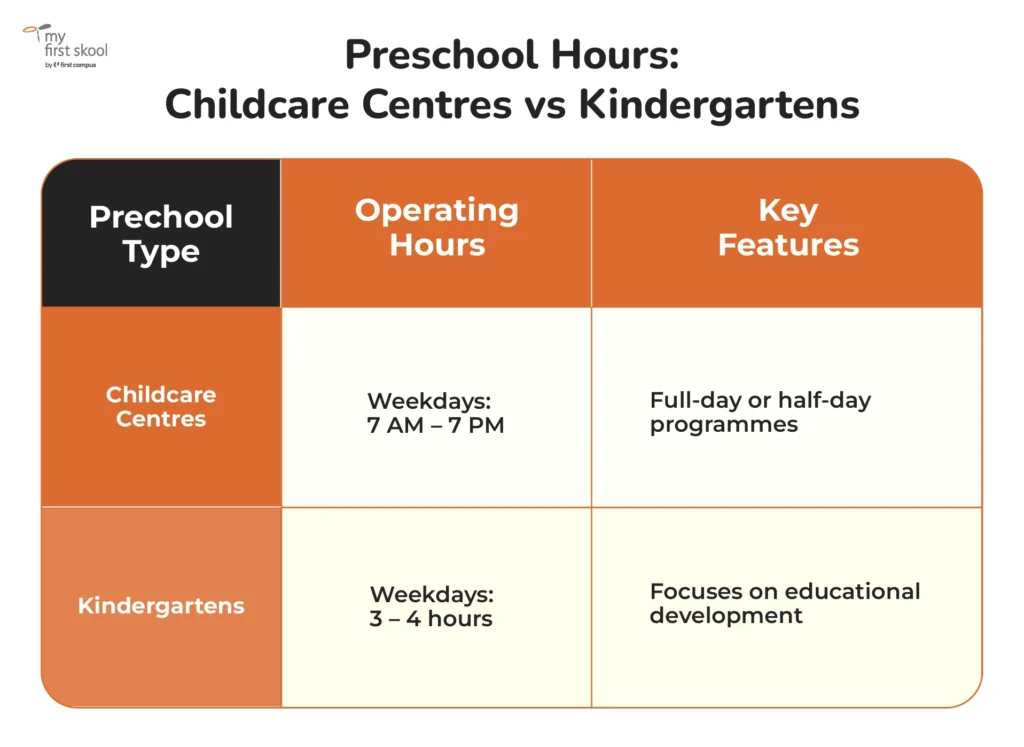
Preschools offering kindergarten-level programmes may operate as childcare centres or kindergartens. Childcare centres offer full-day programmes and usually operate from 7 AM to 7 PM, on weekdays. Kindergartens typically operate for 3 to 4 hours each day, either in the morning or the afternoon, and are closed on weekends and school holidays. Unlike childcare centres, kindergartens focus more on children’s educational development and not on extended care services.
If your children require full-day, extended care, childcare centres may be a better option for you as they ensure that your children stick to a consistent routine and receive essential care services throughout the day.
At My First Skool, we offer full-day childcare services and preschool programmes for children aged 18 months to 6 years old, as well as infant care services for infants aged 2 to 17 months.
Booking a school tour to assess the preschool’s environment and verify that its facilities and resources are as marketed. A supportive school culture also significantly affects a child’s educational experience, and visiting schools helps assess this environment. It’s also useful to look at other parents’ reviews on the preschool or kindergarten you are considering.
Assess the curriculum based on your child’s learning needs
Consider if the preschool’s curriculum and learning environment is aligned with your child’s learning style and developmental needs, to ensure a good fit. Different kindergartens follow different educational philosophies and systems (such as Montessori or Reggio Emilia), and some may prioritise preparing children academically while others may focus more on play-based learning or a skills-based curriculum. Teacher qualifications and the student-to-teacher ratio are also critical elements that impact education quality.
At My First Skool, we have 45+ years of experience in child care and preschool education. All our centres are staffed with trusted, passionate teachers who are professionally trained in early childhood education and are dedicated to ensuring a well-rounded educational journey for your child.
Our relationships-based curriculum employs a pedagogical approach called PETAL© – Playing, Exploring, Thinking, and Applying Learning, which provides facilitated play experiences that encourage active exploration, critical thinking and making meaningful discoveries. These diverse approaches ensure that children receive a comprehensive early education tailored to their unique learning styles.
For children who may experience developmental delays and require more assistance, we also run NTUC First Campus’s pioneer Development Support Specialist (DSS) programme in selected My First Skool Centres. The DSS Programme is focused on children aged 18 months to 6 years old who require a medium level of early intervention support.
The range of fees for preschools in Singapore can vary considerably. However, the Government has put several measures in place to ensure that all children have access to quality early education:
My First Skool has been appointed as an Anchor Operator by the ECDA. We are dedicated to keeping our childcare fees affordable and accessible and offer a number of financial support schemes to benefit families from lower-income or disadvantaged backgrounds.
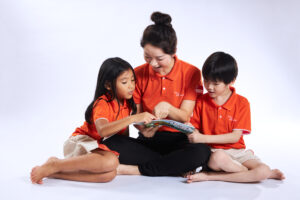
Every year, over 26,000 families all across Singapore see their children benefit from our relationships-based curriculum – one that emphasises forging strong bonds between children, teachers and parents. Find a centre near you or take a virtual tour to explore our learning environments and learn how your child can thrive.
In conclusion, kindergarten education in Singapore offers numerous benefits that lay the foundation for future academic success and overall development. From cognitive and emotional growth to social and physical development, kindergarten plays a vital role in preparing children for their educational journey.
Choosing the right kindergarten is a critical decision that requires careful consideration of various factors, including curriculum, teacher qualifications, and school culture. By understanding the importance of early childhood education and being actively involved in your child’s learning, you can provide them with the best possible start in life.
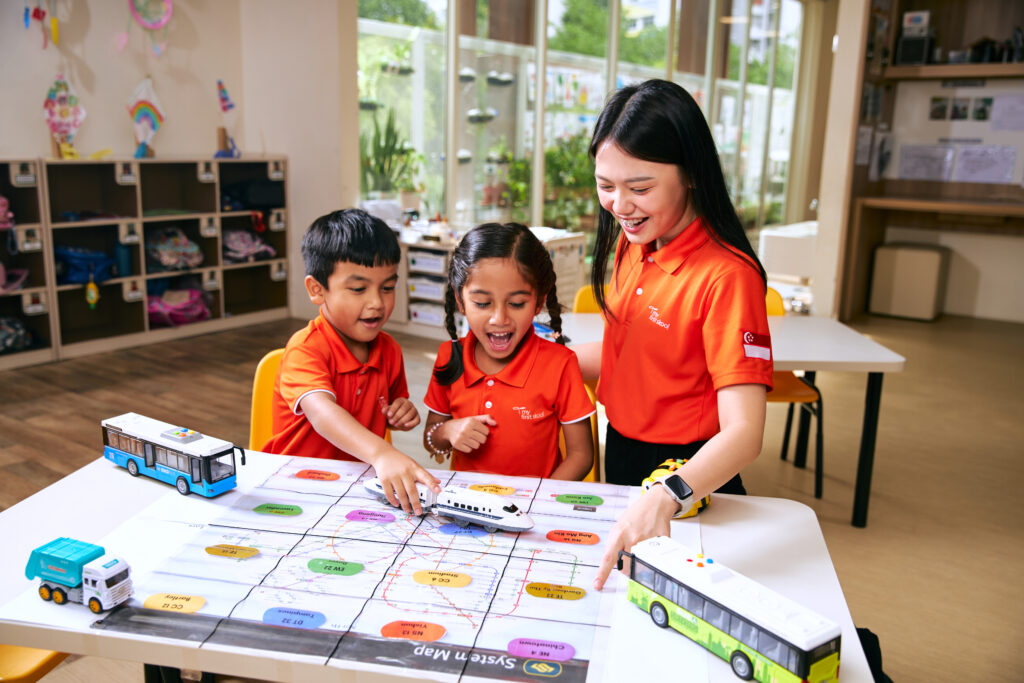
At My First Skool, we believe every child deserves a strong start. As one of Singapore’s most trusted providers of infant care, childcare, preschool, and kindergarten, we offer a nurturing environment where little ones can grow, learn, and thrive. With experienced educators and a proven curriculum, we’re here to support your child’s journey—every step of the way. Registration only takes 5 minutes.
In Singapore, kindergarten is divided into two levels: Kindergarten 1 (K1) for children aged 5 years and Kindergarten 2 (K2) for those aged 6 years. This structure supports the developmental needs of children as they prepare for primary education.
In Singapore, preschools refer to any institutions that provide early childhood education and childcare services to children aged 18 months to 6 years. Preschools may operate as childcare centres or kindergartens.
Preschools offer programmes at the nursery and kindergarten levels, and sometimes the playgroup level.
Before the kindergarten level, the curriculum for other preschool programmes focuses on play-based learning that introduces foundational literacy and numeracy. However, the curriculum at the kindergarten level adopts a more structured approach that emphasises formal instruction in reading, writing, and basic mathematics.
Both childcare centres and kindergartens are preschool operators that offer programmes at the kindergarten level (i.e. K1 and K2).
Childcare centres in Singapore offer services to children from 18 months to 6 years, at the playgroup, nursery and kindergarten levels. Childcare centres provide early education and also essential care services, and usually run both half-day and full-day programmes. Some childcare centres may even offer infant care programmes for babies aged 2 to 17 months.
Meanwhile, kindergartens in Singapore typically operate for 3 to 4 hours daily and focus on academic preparation. They are catered to children between the ages of 3 to 6 years old and offer programs for nursery and kindergarten levels.
In Singapore, parents of Singapore Citizen children may be eligible for Basic and Additional Subsidies under the Infant and Childcare Subsidy Scheme, or subsidies through the Kindergarten Fee Assistance Scheme (KiFAS). These subsidies significantly alleviate the financial burden of early childhood education.
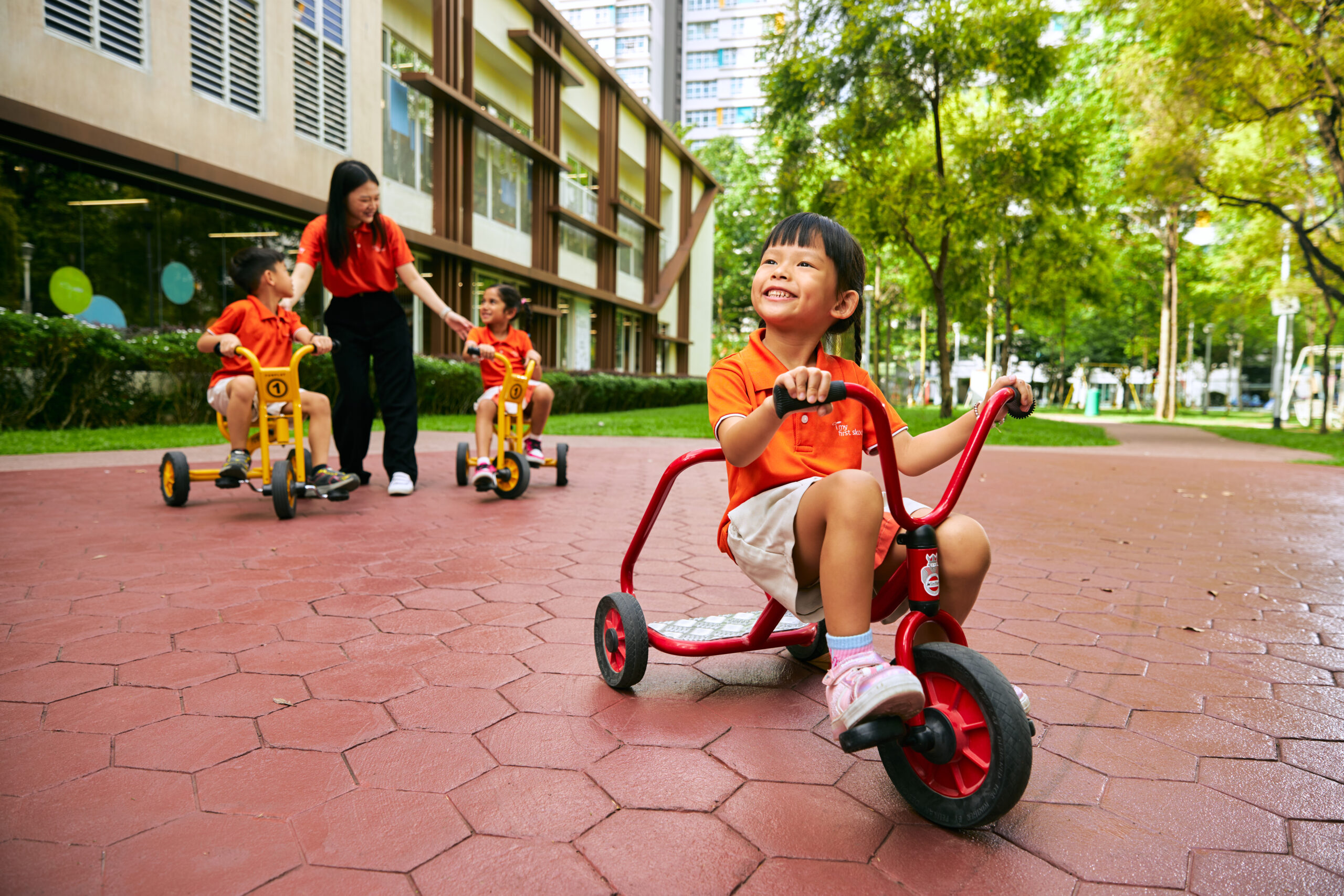
Preschool is also known as Pre-primary school and comprises multiple levels:
According to guidelines set by ECDA, preschools in Singapore are divided into stages that correspond with the child’s age and developmental progress:
| Level | Preschool Age |
| Infant Care | From 2 months to 17 months old |
| Playgroup | From 18 months to 2 years old |
| Pre-Nursery (N1) | In the year they turn 3 years old |
| Nursery (N2) | In the year they turn 4 years old |
| Kindergarten 1 (K1) | In the year they turn 5 years old |
| Kindergarten 2 (K2) | In the year they turn 6 years old |
The official primary school age in Singapore is seven years old.
No, preschool attendance (whether nursery or kindergarten levels) before primary school is not compulsory. However, although it is not mandatory, preschool education is highly encouraged by the Singapore government for all children as it offers significant benefits and can help your child achieve important learning goals. We cover these in detail below.
Enrolling your child in preschool can be an incredibly enriching and positive experience, and allows your child to benefit from the resources and social interactions that may only be found in a preschool setting. Beyond the obvious academic benefits, preschool helps children:
Taking reference from the Nurturing Early Learners (NEL) Framework, which was introduced by the Ministry of Education (MOE) to guide preschool centres in designing and implementing a quality curriculum for children aged 4 to 6, the desired outcomes of preschool education include children being able to:
By the end of their preschool journey, children should possess a good sense of self-awareness, a sound moral compass, and the necessary skills and knowledge to take on future challenges. Each level of preschool is designed with age-appropriate activities to equip your child with the essential skills and mindset needed to thrive in primary school and beyond, and a well-structured preschool programme will lay the groundwork to achieve the above goals.
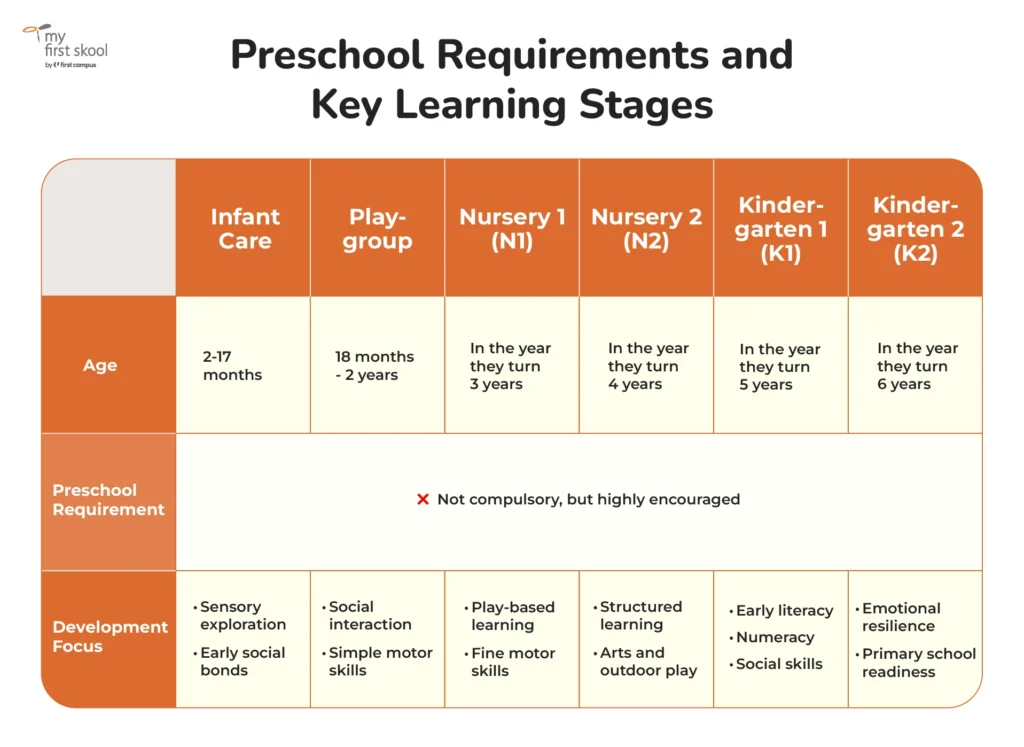
Infant care services cater to infants from 2 months to 17 months old. At this stage, a child’s development is centred around sensory exploration, development of fine and gross motor skills, and early social connections. In these early years, infants learn primarily through interactions with caregivers and their environment, and through activities that are designed to stimulate their cognitive and physical development.
From 18 months old, children will join playgroup programmes. At this stage, learning takes place primarily through exploratory play, with activities designed to enhance social interaction, sensory skills, and simple motor coordination.
Nursery 1 (or pre-nursery) programmes cater to children aged 3 years old and provide a more structured environment compared to playgroups. At Nursery 1, children are introduced to basic educational concepts, but the focus is still largely on play-based learning. Tailored activities such as arts and crafts, sensory play, singing and storytelling help to develop children’s fine motor skills, language abilities, and even early problem-solving.
At 4 years old, children will enrol in Nursery 2 programmes. At this stage, children are introduced to more academic and structured learning activities, such as English and Chinese classes and learning about current affairs, alongside artistic activities and outdoor play.
Kindergarten 1 (K1) and Kindergarten 2 (K2) programmes are for children aged 5 to 6 years old respectively. In these two years, the curriculum becomes more structured and is designed to equip children with foundational academic skills (such as early numeracy and literary skills), social behaviours, and emotional resilience required for their impending transition to primary school.
Choosing the best preschool in Singapore for your child is highly subjective and will ultimately depend on your child’s and family’s unique needs. Parents should consider several key factors, such as:
At My First Skool, we are dedicated to ensuring a well-rounded educational journey for your child, through an enriching learning environment and a curriculum designed to support holistic development. We have 45+ years of experience in child care and preschool education, and 100% of our eligible centres are SPARK-certified, an assurance of quality by ECDA.
At My First Skool, we empower our children to learn through a pedagogical approach called PETAL© – Playing, Exploring, Thinking, and Applying Learning. This approach provides facilitated play experiences that encourage active exploration, critical thinking and making meaningful discoveries.
We recognise that children are unique individuals. They explore their environment, form opinions, and want to be heard. As such, we centre our curriculum around relationships, forging close bonds, and building genuine connections with the children and parents.
We take children on excursions designed to enhance their experiences and deepen their understanding of the world around them. We also offer a varied combination of mother tongue languages across our centres and train children in digital literacy to ensure they are equipped with the skills to navigate digital tools in today’s technological era. These diverse approaches ensure that children receive a comprehensive early education tailored to their unique learning styles.
My First Skool offers programmes for children across all early education levels, with full-day childcare services and preschool programmes for children aged 18 months to 6 years old, as well as infant care services for infants aged 2 to 17 months. This allows children to have a seamless transition as they progress through each preschool level. With over 160+ conveniently located centres across Singapore, My First Skool provides families with access to quality preschool services near work or home.

At My First Skool, we believe every child deserves a strong start. As one of Singapore’s most trusted providers of infant care, childcare, preschool, and kindergarten, we offer a nurturing environment where little ones can grow, learn, and thrive. With experienced educators and a proven curriculum, we’re here to support your child’s journey—every step of the way. Registration only takes 5 minutes.

Every year, over 26,000 families all across Singapore see their children benefit from our relationships-based curriculum – one that emphasises forging strong bonds between children, teachers and parents. Find a centre near you or take a virtual tour to explore our learning environments and learn how your child can thrive.
A child can attend daycare or childcare centres in Singapore from as early as 18 months, with some centres also providing infant care for children aged 2 to 17 months. At My First Skool, we offer full-day childcare services and preschool programmes for children aged 18 months to 6 years old, as well as infant care services.
Enrolment for placements in My First Skool is open all year round, depending on the availability of vacancies. Registration may be submitted up to 12 months before your child’s preferred enrolment date. This is available for Singapore citizens, permanent residents and foreigners.
Go on a virtual centre tour of a preschool near you and explore our learning environments from the comfort of your own home.
Subsidies provided by the government can greatly alleviate the cost of preschool education for families. All Singapore Citizen children enrolled in ECDA-licensed infant or childcare centres and in kindergartens operated by Anchor Operator (AOP) or the Ministry of Education (MOE) are eligible for preschool subsidies, which comprise the basic subsidy and additional subsidy under the Infant and Childcare Subsidy Scheme, and subsidies under the Kindergarten Fee Assistance Scheme.
Note that you can only apply for a preschool subsidy after securing a place for your child with a preschool. On the first day of your child’s enrolment, parents should submit a Form 1 (Child Care Enrolment and Subsidy Application) or KF1 (Enrolment and Kindergarten Fee Assistance Scheme (KiFAS) application), acknowledgement letter, and relevant supporting documents to the preschool.
At My First Skool, we are dedicated to keeping our childcare fees affordable and accessible. Families with household income of $6,000 and below will enjoy priority for enrolment. Further, we also offer a number of financial support schemes to benefit families from lower-income backgrounds.
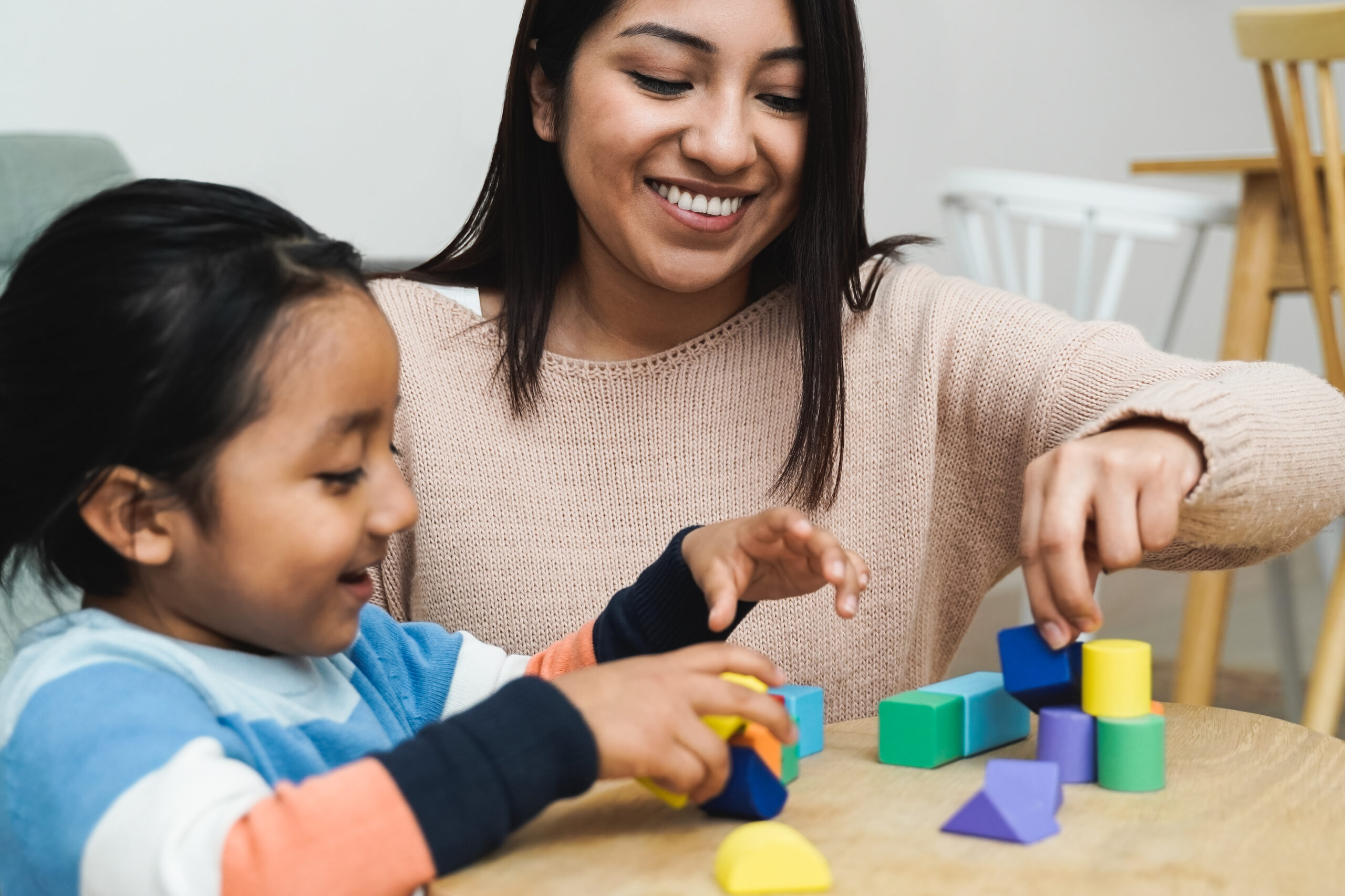
Preschool is a magical time in a child’s life when they are like sponges, absorbing knowledge and experiences rapidly. It’s also a time when building solid foundations for future learning and personal development is crucial.
In this article, we will shed light on the concept of relationship-first education in Singapore, what it entails, and why it’s essential for a child’s early learning journey.
Relationships-first education is an approach to preschool education that prioritises the establishment and nurturing of meaningful relationships as the foundation of a child’s learning experience.
It goes beyond traditional academic focus and emphasises the importance of emotional and social development. Here’s a closer look at some critical aspects of this approach.
One of the central tenets of relationship-first education is the focus on emotional intelligence. Emotional intelligence involves understanding and managing emotions and relating to others with empathy and sensitivity.
In a preschool setting, this means creating an environment where children can express their feelings, recognise emotions in themselves and others, and develop the skills to navigate social interactions effectively.
Through close relationships with both teachers and peers, children have the opportunity to practise these essential emotional skills. Teachers attuned to their students’ emotional needs can provide guidance and support when children face emotional challenges, helping them develop resilience and self-regulation.
As children learn to understand and express their feelings, they become better equipped to navigate the complexities of human relationships, which is a lifelong skill.
While relationship-first education emphasises social and emotional development, it doesn’t neglect cognitive development. It recognises that strong emotional bonds and a secure attachment to caregivers provide a solid foundation for mental growth. When children feel safe, loved, and supported, they are more receptive to learning.
Preschools in Singapore that prioritise relationships-first education implement play-based learning and exploration. These activities enhance cognitive skills like problem-solving, creativity, and critical thinking while doing so within the context of positive relationships.
For example, children engaged in group play and projects learn cooperation, negotiation, and communication, all essential cognitive and social skills.
Confidence and self-esteem are critical components of a child’s self-concept. Relationships-first preschool education is pivotal in building a child’s confidence by recognising and celebrating their individuality. When teachers and peers appreciate and support a child’s efforts, it fosters a sense of self-worth and a belief in their capabilities.
A nurturing educational environment encouraging children to take risks, make choices, and learn from their experiences can boost their self-esteem. It helps them develop a growth mindset, where they see challenges as opportunities for growth rather than threats to their self-worth.
Children are naturally curious, and relationships-first education harnesses that curiosity as a powerful learning driver. By fostering a preschool environment where children feel secure and encouraged to explore, ask questions, and make discoveries, this approach kindles a lifelong love for learning.
Teachers play a critical role in nurturing curiosity by responding to children’s interests and inquiries. When children feel their questions are valued and their exploration is supported, they become more engaged and motivated. The emphasis is on the learning process rather than just the results.
In relationship-first education, parents are vital partners in a child’s educational journey. Open and consistent communication between preschool teachers and parents fosters a collaborative approach to a child’s development. This partnership can include sharing insights on a child’s personality, preferences, and strengths, as well as discussing strategies for addressing any challenges.
When parents take a proactive role in their learning and feel connected with the preschool, it creates a holistic support system for the child. This partnership ensures that the child’s emotional and educational needs are consistently met, both at school and at home.
So, how is relationship-first education practically implemented in a preschool setting? Here are some strategies and practices that My First Skool employs to nurture relationships in education.
Smaller class sizes allow more space for personalised attention and stronger teacher-child relationships. With fewer students to attend to, our teachers can better understand each child’s unique needs and tailor their approach accordingly.
We train our teachers to be responsive educators. Teachers who are attuned to children’s emotions and needs can better support them by actively listening, showing empathy, and building trust and close bonds.
Play is a child’s natural way of learning, and it is through play that they form relationships with their peers. My First Skool adopts play-based learning using the PETAL pedagogy, empowering the child to Play, Explore, Think and Apply learning to collaborate, negotiate, and develop their social and cognitive skills.
Providing emotional support for children is a crucial aspect of relationships-first education. Our teachers are trained to offer comfort and reassurance when children are upset, helping them process their emotions and develop emotional resilience.
Recognising and celebrating each child’s unique qualities and cultural backgrounds creates an inclusive and accepting environment. Being inclusive fosters respect and understanding among peers and contributes to positive relationships. At My First Skool, we are always committed to celebrating diversity.
Relationships-first education places relationships at the heart of a child’s preschool learning journey in Singapore. By focusing on emotional intelligence, cognitive development, self-esteem, curiosity, and the partnership between parents and teachers, this approach sets the stage for successful learning and healthy social interactions.
Besides preparing children for primary school, My First Skool creates a supportive and nurturing environment where they can flourish. Children will know they are valued for who they are and encouraged to explore the world around them.
Get your child a head start! Learn more about us and our curriculum, get in touch with us today!
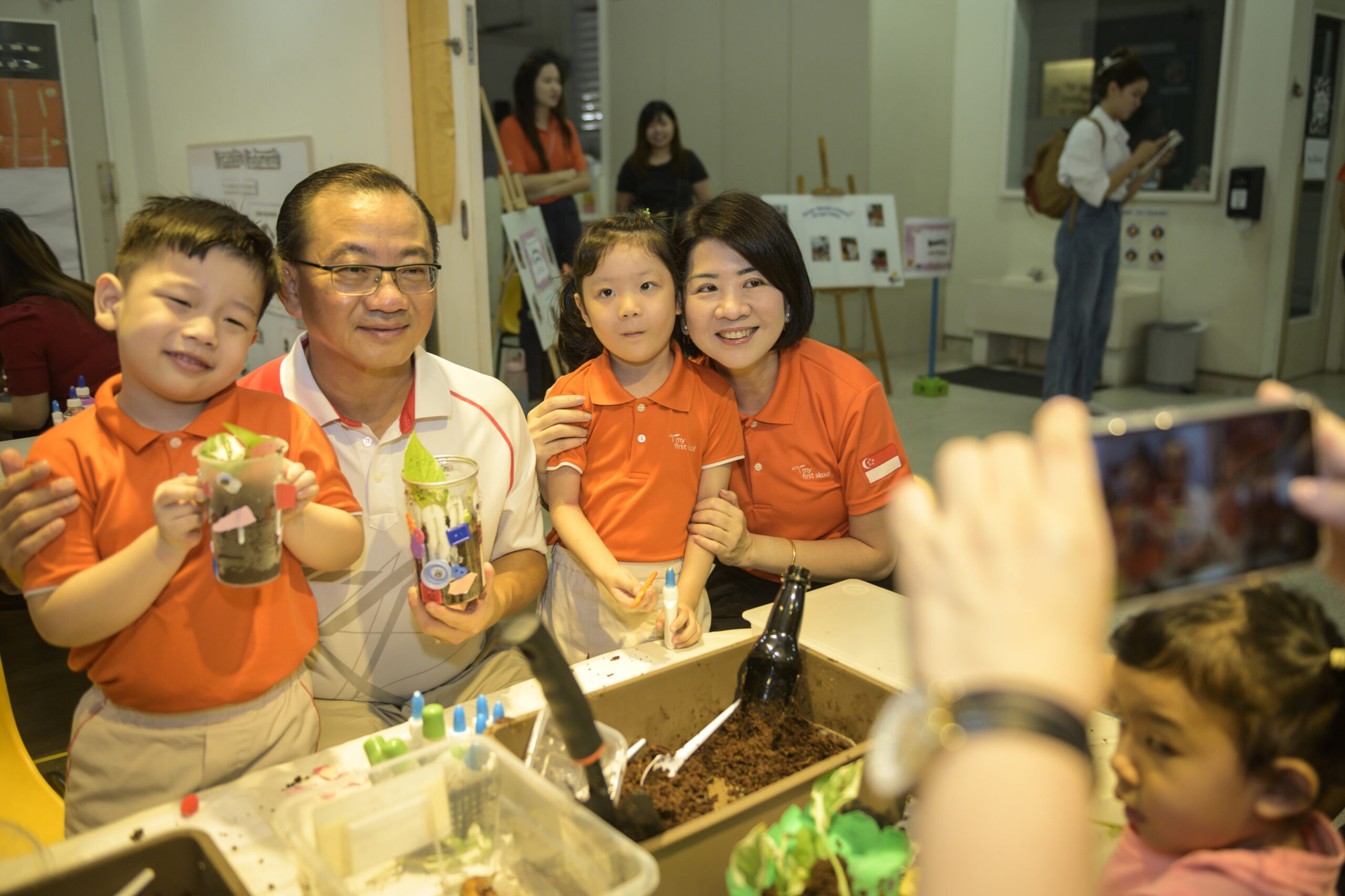
Guest of Honour Mr Seah Kian Peng, Speaker of Parliament and Group Chief Executive Officer of NTUC Enterprise (second from left) posing with two children from My First Skool at Braddell Heights and My First Skool’s General Manager Ms Thian Ai Ling (first from right) with their plants during the preschool centre’s fundraising event on 19 August 2023.
Five-year-old Kieran Emmanuel Albuquerque squints in concentration as he carefully places a paper cutout on his elderly friend’s flower pot made using a recycled plastic bottle on Monday morning (14 August) at NTUC Health Senior Day Care in Serangoon Central.
This interaction between children from MFS at Braddell Heights and seniors at the day care centre next door has been a weekly affair since the launch of NFC’s and NTUC Health’s structured Intergenerational Programme in 2017.
Since July this year, their weekly sessions have focused on their fundraising collaboration where they create recycled flower pots to raise funds at today’s fundraising event for BHF, NFC’s charity fund. Besides the sale of recycled flower pots, the event included funfair booths for families to take part in. Mr Seah Kian Peng, Speaker of Parliament and Group Chief Executive Officer of NTUC Enterprise, was the Guest of Honour at the event.
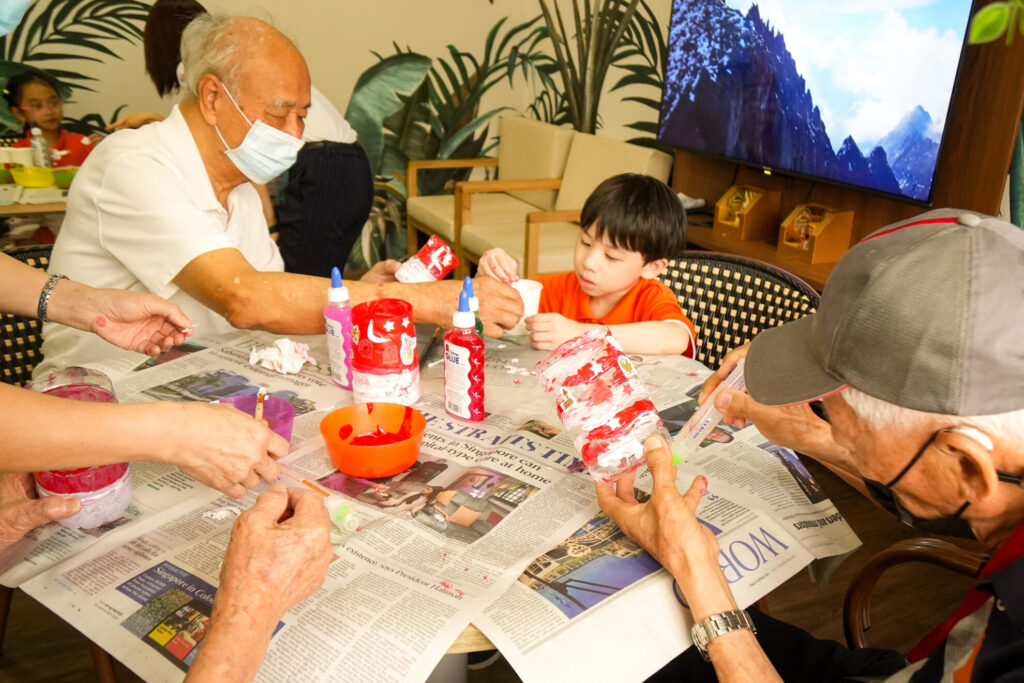
Five-year-old Kieran Alburquerque from My First Skool at Braddell Heights decorated recycled flower pots with a senior from NTUC Health Senior Day Care at Serangoon Central on 14 August 2023. These flower pots would be sold during a fundraising event at the preschool centre on 19 August 2023 to raise funds for NTUC First Campus’s Bright Horizons Fund, which will benefit children and families from low-income backgrounds.
“As our young children engage with the seniors, their families, friends, and the community to raise funds for a good cause, they build relational skills through effective communication and teamwork, and build empathy and respect for others. These are skills that are greatly beneficial for their holistic development,” said Ms Thian Ai Ling, General Manager at My First Skool.
Lawrence Teo, Head of Senior Day Care at NTUC Health said, “At NTUC Health, we believe that our community as a whole can play a part in connecting generations. Through intergenerational activities, there is so much our seniors can impart to the younger generation by way of their personal experiences and life lessons. The young can also help seniors to reignite that spark of curiosity and excitement to learn something new and to live agelessly.”
Started in 2008, BHF helps children and families from low-income backgrounds, and also children with learning needs, through various support programmes. These programmes cover three aspects to ensure holistic support for children and families: financial aid, health and well-being, and learning support. More than 37,000 children have benefitted from BHF’s programmes thus far, and more than $19 million has been disbursed to families.
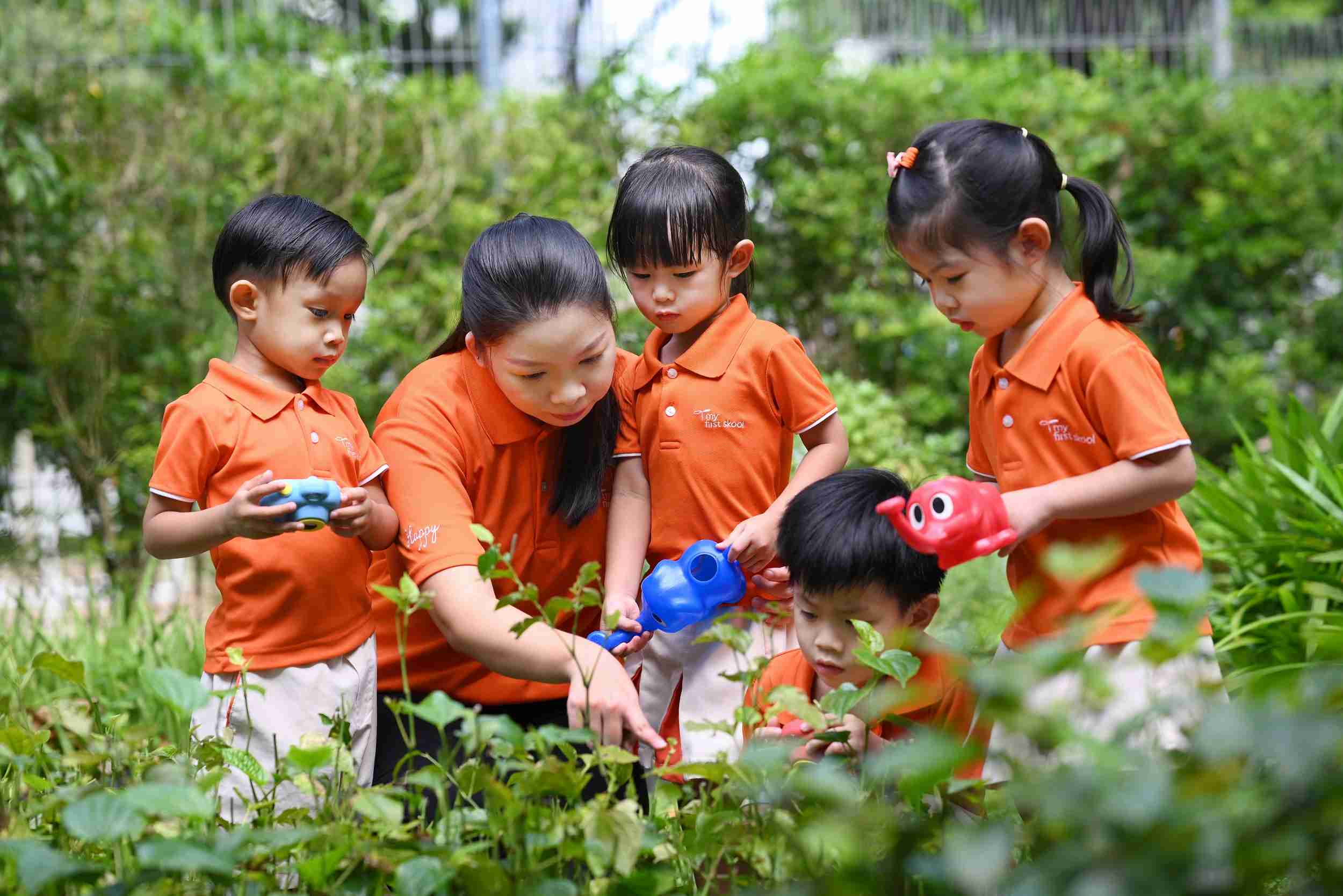
A principal who guides teachers to create engaging learning spaces for children. An early years educator who goes the extra mile to visit parents whose child need additional support in their learning, and offer tips on extending the child’s learning at home. A preschool centre with a rich outdoor space for children to explore, inquire and care for the environment.
These are three of five My First Skool’s (MFS) outstanding winners who were recognised at this year’s ECDA Awards 2022 award ceremony on October 29.
The ECDA Awards for Excellence in Early Childhood Development recognises the exemplary achievements and accomplishments of educators, early intervention professionals, leaders and centres that have excelled in their teaching and learning, and innovative practices in the early childhood sector.
This is a list of our winners and finalists for the ECDA Awards 2022:
1. Outstanding Early Childhood Leader (Winner) – Ainul Farhana Binti Mohamed Bathurudin, My First Skool (2 Punggol Drive)
2. Promising Early Childhood Leader (Winner) – Ruzita Binte Zainuddin, My First Skool (Blk 612 Yishun)
3. Outstanding Early Years Educator (Winner) – Nur Azlin Binte Ramlan, My First Skool (505 Yung An Road)
4. Outstanding Centre for Teaching and Learning (Winner) – My First Skool (51 Fernvale Link)
5. Early Childhood Innovation (Winner) – ‘Outdoor Learning about Pangolins & Otters’ Project, My First Skool (Blk 180B Boon Lay)

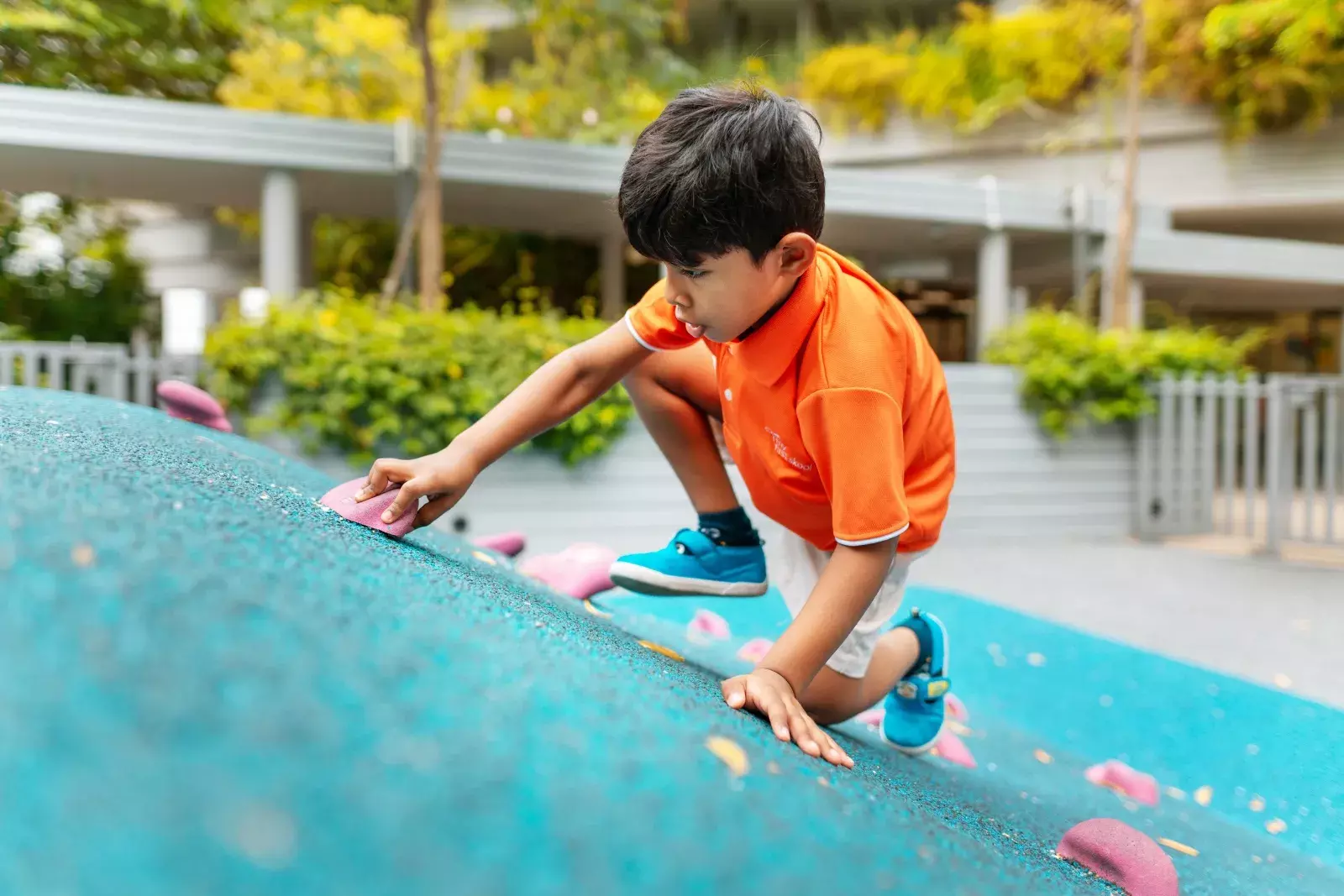
“The more that you read, the more things you will know. The more that you learn, the more places you’ll go.” – Dr. Seuss
During these uncertain times, many people are discovering how important resilience is in their lives and be able to persevere and overcome the obstacles they face. Resilient people demonstrate their ability to bounce back, get their lives on track and stay on course, never letting their environment take control of their emotions and decisions.
This is an important skill that needs to be developed in children from an early age, so they too, can have the resilience to handle setbacks and failures, deal with adversity and change, and to keep going when things get difficult.
As parents, how can we help our children to develop resilience?
In addition to setting positive examples for children and occasionally stepping aside to let them bounce back from small failures on their own, you can also inspire your child with the fascinating characters, role models and stories found in these 10 recommended books.
Synopsis: This charming story is based on a real-life event that happened to the author’s grandchildren, and tells the tale of a little yellow digger who gets stuck in the mud. A bigger-sized digger is called in to help free the little digger, and this is where the story takes an inspiring turn. We’ll keep the ending a secret, so you can discover this wonderful tale with your child!
Why this book is good: This book teaches children that physical size doesn’t always matter, it’s the size of your heart and spirit that counts!

The Little Yellow Digger
Synopsis: In this book, your child will read about a spider who was blown by the wind to a fence near a farmyard. She starts spinning her web and is absolutely focused on the task at hand – refusing to be distracted by any of the other farm animals and demonstrating resilience in accomplishing her task. She’s finally rewarded when she manages to catch a pesky fly in her web, delighting the other animals who now see her as their hero.
Why this book is good: By following the story of the very busy spider, your child can comprehend the value of striving towards their goals.
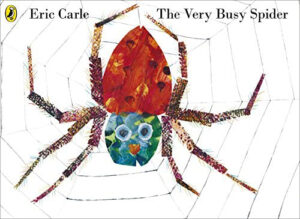
The Very Busy Spider
Synopsis: The classic nursery rhyme gets brought to life in this expanded adaptation. This book introduces children to the itsy bitsy spider, a tiny spider who keeps climbing a water spout, only to be washed down again – except in this story, our determined little spider has his day as he manages to achieve his goal of climbing up the spout.
Why this book is good: This fun little book will teach your child about determination, while expanding their imagination as they read about a never-heard-before story about this famous nursery rhyme character.
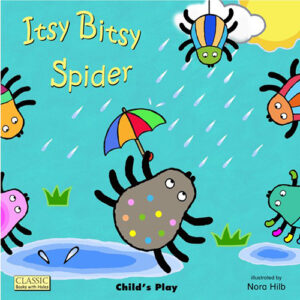
Itsy Bitsy Spider
Synopsis: Your child will love this hilarious story of Farmer Brown and his cows, who have an interesting way to telling Farmer Brown about the changes they’d like to see implemented in the barn – they use a typewriter to type their requests to him!
Why this book is good: This title shows children the value of communication, cooperation and compromise. Through the cows’ resilience, children also discover the importance of not giving up – even when things don’t always go their way.
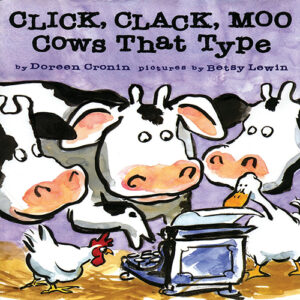
Click, Clack, Moo Cows That Type
Synopsis: As your child goes through life, they will undoubtedly encounter hurdles and setbacks – and this story is all about these “messed up” moments. In this tale, Little Louie just wants to tell his story, but it keeps getting messed up!
Why this book is ideal: Embark on an adventure with Little Louie and let your child see how Little Louie learns valuable lessons in resilience and embracing life’s not-so-perfect times.
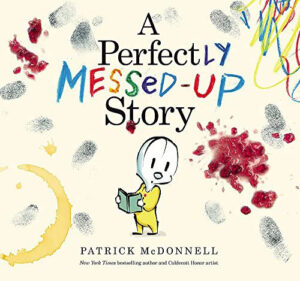
A Perfectly Messed-up Story
Synopsis: Lou is an adventurous little girl, but one day she faces an unfamiliar challenge. Her friends want to climb a tree and Lou is unsure of herself – so she makes up reasons for not joining her friends, saying that her arm is sore, she couldn’t climb because she had just eaten, and other excuses.
Why this book is good: This delightful picture book depicts what children often go through when confronted with difficult situations, then teaches them how to overcome their fears, become more courageous, and adopt a growth mindset.
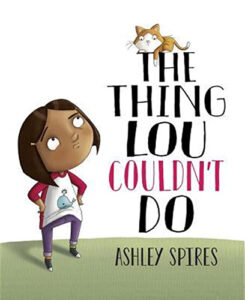
The Thing Lou Couldn’t Do
Synopsis: The Tiny Seed tells the story of tiny flower seeds that are blown across the land by the wind, and how the most resilient seeds survive many obstacles to eventually sprout into plants and bloom into flowers – starting the amazing process over again.
Why this book is good: A highly recommended read for children aged 4 to 6 years old, this short story teaches children about the life cycle of a plant and gives them a new appreciation for nature, resilience, growth and life.
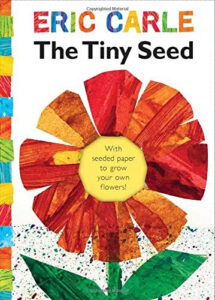
The Tiny Seed
Synopsis: Rosie has a creative mind and dreams of becoming an engineer. She collects odds and ends that other people see as “rubbish”, and every night, uses these odds and ends to construct incredible inventions while alone in her room. But because Rosie is afraid of failure, she hides her inventions away, until one day…. someone changes her life, forever.
Why this book is good: This heartfelt story will teach your child the importance of overcoming the fear of failure and discovering the incredible joy of being their truest self.
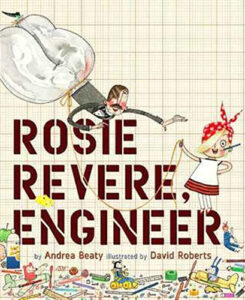
Rosie Revere, Engineer
Synopsis: Poor humpty dumpty. His biggest claim to fame is falling off a wall and not being put back together again. This fun book rewrites this famous nursey rhyme and shows a side of humpty dumpty that children haven’t seen before – his determination in getting back up again and achieving what he set out to do.
Why this book is good: Parents can use this story to teach their children about what could happen with determination and resilience. With these qualities, humpty dumpty is no longer the egg who fell off the wall, he’s the egg who back up and reached new heights!
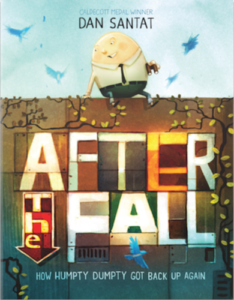
After the Fall: How Humpty Dumpty Got Back Up
Synopsis: Is your child interested in nature? If so, this book belongs at the top of their reading list. Plant the Tiny Seed follows a tiny seed through its entire life cycle as it grows into a gorgeous zinnia.
Why this book is good: The book encourages interactive play as your child is instructed to wiggle their fingers to water the seed, clap to make the sun shine, and other fun activities. In addition to learning the value of resilience, your child will also discover interesting facts about all the seeds, flowers, insects and animals that are featured in this title.
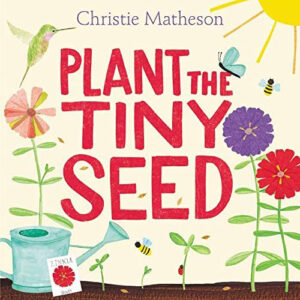
Plant the Tiny Seed
Reading books with your child is a fantastic way to nurture a close relationship with them.
At My First Skool, we believe that a strong relationship between a child and their parents, teachers and caretakers is the key to inspiring them towards growth. Children learn better from people they trust, and when they feel safe and comfortable in their learning environment.
This close-knit relationship between teacher and child is the foundation of our relationships-based curriculum (RBC), which develops children who are confident, resilient, and have an “I can do it” mentality. These positive bonds encourage children to learn, as they feel the genuine care, concern and support that they are receiving from their teachers. This is the type of supportive relationship that RBC sets out to build.
To learn more about our curriculum, speak to us or register for a live centre tour.
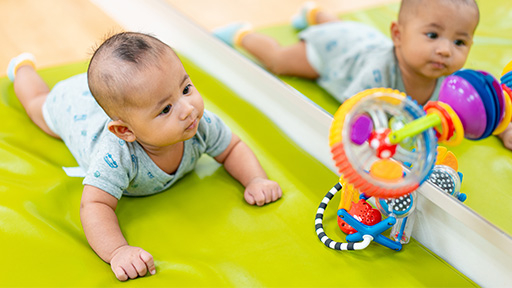
As a new parent, your little bundle of joy is everything. And when the time comes for you to get back to work, it’s essential to choose an infant care centre that you can trust.
Today, we look at the factors you need to consider when selecting a daytime home for your 2 to 18-month-old infant. But first, we compare infant care centres with home-based help (i.e. Hiring a domestic helper or nanny).
When it comes to caring for children, there is no doubt that domestic helpers and nannies can care for your child while you are working. However, there are numerous reasons why many Singaporean parents prefer a reliable infant care centre.
Firstly, with the current COVID-19 measures in place, it can be challenging to hire a domestic worker. What’s more, some parents may have concerns about privacy and having another person live in their home.
More importantly, at an infant care centre, your child gets to learn and grow in a stimulating environment with early childhood development professionals who are equipped with the expertise and tools to help infants and toddlers develop.
In addition to having social interactions with children in a similar age group, an infant care centre will provide your child with opportunities to be exposed to their mother tongue. This is especially important if parents speak primarily English at home, or may not feel comfortable speaking in their mother tongue.
Now that we’ve determined why infant care is an ideal choice for parents, let us see the seven most important factors you should think about when choosing infant care services.
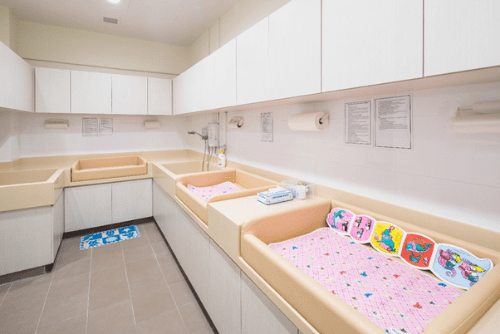
#1: Centre Environment
Take a look at the centre and observe the infants’ sleeping and play areas. Are they safe and conducive for infants? Is the place a sensory-rich environment that is ideal for learning?
At My First Skool, our infants’ sleeping area is separated from their play area, which ensures that infants get restful sleep during nap times. Our play areas are safe, sensory-rich environments that contain books, handmade learning materials, and everything else infants and toddlers need to develop. Our furniture are child-friendly, with padded areas that keep infants stay safe and sound, even as they learn to crawl and tumble.
#2: Services and Curriculum
Ask if your shortlisted centre provides routine care services, or if they have a dedicated curriculum that provides your child with other forms of stimulation and enrichment during their formative years.
Infants at My First Skool undergo our relationships-based curriculum (RBC) programme – a curriculum for children 0 to 3-years-old that is proven to build strong, nurturing relationships between teacher and child.
It is important for a child to feel secure and attached to their teacher, because when a child feels secure, learning happens! Research has shown that children are more engaged and involved in learning when a relationships-based approach is adopted. Our Relationships-based curriculum approach helps children to develop a positive “I can do it” spirit, while also building confidence and resilience!
“Thank you for caring for Liam ever since he joined the school as a tiny infant. His smiley face every day is a testament to the joy and secure environment he receives from school daily and it warms my heart to know he’s well taken care of with many “mummies” at infant care. Keep up the good work!” – Lorraine, Parent of Infant at My First Skool at Blk 269 Compassvale Link
#3: Teachers
All infant care teachers in Singapore possess a Higher Certificate in Infant Care (or higher), so you can be assured that your child is being looked after by a trained professional.
At My First Skool, our teachers also undergo rigorous training on how to observe, document and come up with learning plans to suit each child’s unique needs.
To do so, teachers maintain regular documentation of each child’s level of well-being and active involvement in activities. Through keen observation and documentation, our teachers track detailed aspects of your child’s development – and communicate these findings with you.
#4: Parent Communication
Be sure to ask about the level of communication your preferred infant care centre has with parents. This is an essential, but often overlooked factor for many parents.
At My First Skool, we believe that communication between parents and their child’s school is paramount to a child’s development and wellbeing. Here, we inform parents of their infant’s feeding times and amounts – providing assurance and peace of mind that their child is being well cared for.
Your child’s main caregiver will frequently engage with you, sharing all this important information, while also understanding how your child is doing at home. You can also log in to our convenient parent portal app to find this information, as well as consistent developmental updates on your child.
“Having 2 young children attending school at a tender age can be daunting but the love and care showered by the leaders and teachers with prompt updates have given me the assurance while I’m at work.A big thank you to the infant care teachers who diligently captured my son’s milestones since his infant years and to the Toddler teachers now for your patience with my playful little monkey.” – Astraea’s and Isaiah’s Parent, My First Skool at Blk 82 Strathmore Avenue
#5: Meals
Nutrition is vital for growing infants, so it is important to check what type of meals your child will be getting at your preferred infant care centre.
Here at My First Skool, every meal is planned by our nutritionist and in-house chef to ensure children receive a nutritious, balanced diet that is in accordance with the Health Promotion Board’s guidelines.
As every child develops at a different pace, we keep in constant communication with parents to determine the ideal time to start weaning a child on solid food. For infants who can take solid food, we recommend that they eat their meals (breakfast, lunch and tea break) at our centre.
Our nutritious meals are perfect for introducing new food types to your child in a gradual manner, so they will be well-acclimated to healthy solid foods by the time they reach 18 months of age.
Here are just a few examples of the tasty meals that infants enjoy at My First Skool:
#6: Location
Accessibility is incredibly important! Having a preschool located near your home will allow you to spend more time resting and engaging with your child, and less time on travelling. This leads to happier parents and happier children!
With 145 centres island-wide and 115 of these centres offering infant care services – the My First Skool network is easily the most easily accessible preschool for many Singaporean families!
#7: Fees
As part of the NTUC First Campus family, our philosophy is to give every child a good head start in life – regardless of their background or financial capabilities. This ethos is reflected in our affordable fees, high-quality care and curriculum. Even better, working mothers can enjoy an infant care subsidy of $600 per month when you place your infant with us – making your infant care investment an affordable $764.25 a month.
Learn more about our fees here.
Interested in seeing how our infants spend their days at our centres? Take a look at their daily routines here. At My First Skool, we are truly committed to raising happy, healthy children who embody an “I can do it!” spirit – and we do so with our innovative curriculum, nutritious meals and engaging learning environments.
Give your child the head start they deserve by sending them to a My First Skool centre near you. Visit us to find out more!
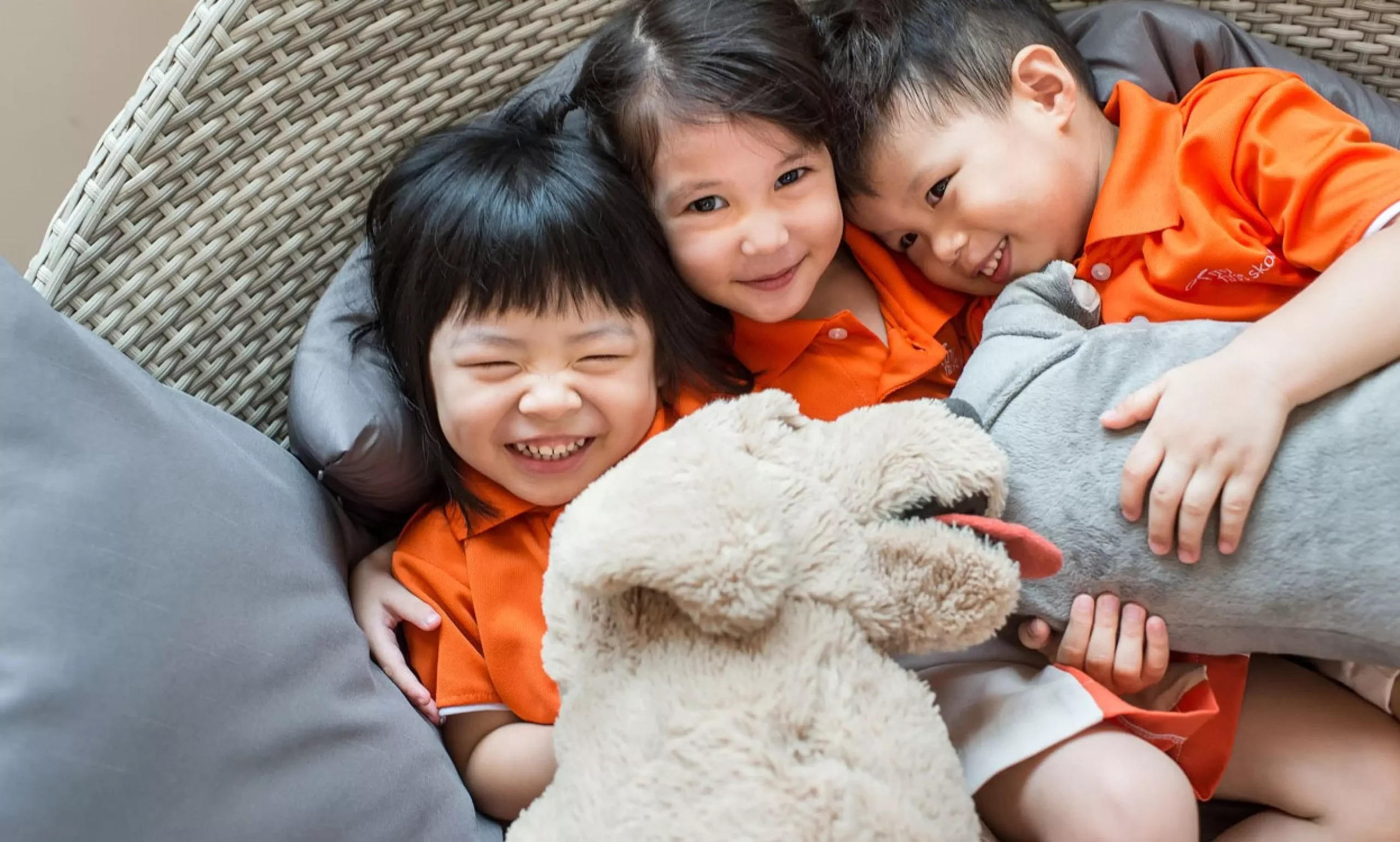
A common misconception among Singapore parents is that good preschools are expensive, leaving them with only two options – pay a pricey monthly fee for a reputable preschool, or save money by choosing a preschool that doesn’t offer the quality of care and education that they want for their child.
But is it true that your child can’t get the best of both worlds in Singapore? That is, a quality preschool with affordable fees?
We’re here to shatter this misconception.
At My First Skool, our standards are second to none. Whether it’s the qualifications of our educators, the quality of our learning environments, our proven curriculum, or anything else – you’ll find that we’re not simply on par with other reputable preschools, we exceed expectations. My First Skool is one of the best preschools in Singapore with affordable preschool fees.
1. The best minds, and the best practices, in the industry
We are proud of the curriculum used in (and out of) our classrooms. From our core curriculum to meal planning, every aspect of a child’s life at My First Skool is developed by a team of professionals in their areas of expertise. We have a large number of early childhood professionals who hold doctorates in their fields, and are well-recognised for their contribution in the sector.
Also, we have quality managers who ensure that educational practices are consistent across all the centres in our islandwide network. Parents will be glad to know that 100% of My First Skool centres that are eligible for SPARK certification, have been certified.
Going a step further, we also work with well-respected industry partners to ensure that our lessons and activities are the very best they can be.
2. Our evidence-backed curriculum is ideal for infants and toddlers
My First Skool is well-known for our relationships-based curriculum (RBC), which is our proprietary curriculum that is backed by science and evidence. In fact, research has shown that children who have undergone RBC display higher levels of active involvement, such as better concentration levels during learning. This is because of the trust infants and toddlers build with their educarers, which gives them the confidence and ability to learn and develop at their best.
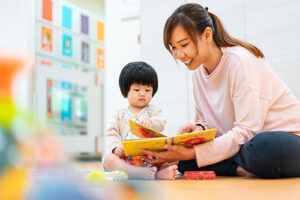
3. Niche programmes are featured in our classrooms
And this curriculum expands beyond the lessons our experts have developed. We also work with well-respected industry partners to incorporate niche programmes such as STEM-based learning (i.e. science, technology, engineering, maths), arts, bilingualism and cultural intelligence, character building, nature learning, and Malay heritage into our schedule.
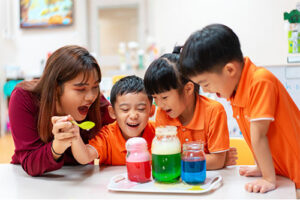
4. Conducive learning environments
Our schools are designed to optimise learning and development in young children. In our learning environments, you’ll find an impressive selection of learning resources, interactive learning corners that engage children in fun and creative ways, and plenty of opportunities for children to learn and play, both indoors and outdoors.
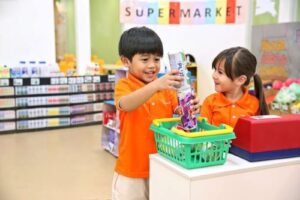
5. We implement industry-leading safety practices
When it comes to adopting best practices in health and safety, My First Skool has always led the way. And with concerns over the COVID-19 pandemic, we have proactively implemented best practices in all our centres. Our schools are stocked with commercial grade UV sterilisers, which our teachers and staff use to sterilise toys, kitchen equipment, as well as other items and areas. At our larger centres, temperature sensors are used to keep an eye on everyone’s temperature throughout the day.
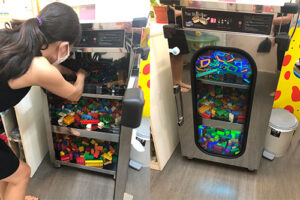
6. Our children enjoy healthy menus, planned by dieticians and nutritionists
When it comes to food, we focus on building healthy eating habits and preferences in children. Our children are treated to a wide variety of dishes from our tasty-yet-healthy menu, which is rotated bi-weekly to keep children’s interest in these healthy meals high. Every meal is planned by our expert dieticians and nutritionists, and prepared by our in-house chefs.
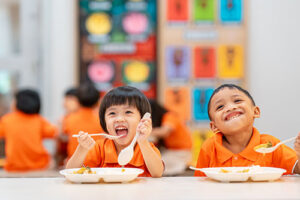
Best of all, we take pride in being recognised as a preschool that most Singaporeans can comfortably afford. As part of NTUC First Campus family, My First Skool provides affordable preschool education for children across Singapore while delivering exceptional value and quality. We also do our part to reach out to children from low income families with the Bright Horizons Fund, so every child can get a good head start in life.
So, if you believe that good preschools always come with big fees, we’d like to invite you to tour any of our 140 centres across Singapore, take a look at our learning environments, understand our curriculum, and check out our fees here. We look forward to seeing you!